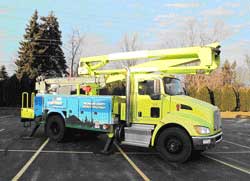

Lorrie Lisek, Executive Director of Wisconsin Clean Cities Southeast Area, Inc., noted “The implementation of this technology in the Wisconsin Clean Transportation Program has resulted in efforts not only to reduce our nation’s dependence on petroleum, but to additionally improve air quality and develop statewide economic opportunities.”
Odyne’s proprietary and patented hybrid technology combines reliable electric power conversion, power control and energy storage technology with Remy advanced electric propulsion motors, modular Johnson Controls lithium-ion battery systems and other robust, automotive quality components. The Odyne plug-in hybrid drive system reduces fleet operating and maintenance costs, and depending on duty cycle, enables large trucks to obtain significant fuel economy improvements compared to traditional diesel engines. The Odyne advanced hybrid system also lowers emissions and provides a quiet, safe working environment with good work site communication, setting the new benchmark for the hybrid work truck industry.
The following have received advanced Odyne hybrid systems under the Wisconsin Clean Transportation Program:
Milwaukee County took delivery of four work trucks in December 2011 and January 2012 that will be used throughout Milwaukee County to maintain traffic signals and street lighting. Although the county automotive fleet includes hybrids, these are the first hybrid trucks they are putting to work. Manufactured by DUECO, Inc. the vehicles feature the first Odyne hybrid systems installed on Kenworth truck chassis and are the first to power Venturo corner mount cranes, which will be used in sign maintenance and to lift lighting as the county switches to more efficient LED lighting. The trucks feature fiberglass bodies and Terex TL60 aerial buckets, recognized for their stability.
Marshfield Utilities, serving the city of Marshfield, Wisconsin took delivery of its first Odyne hybrid truck in 2009. A second truck with a more advanced Odyne plug-in hybrid system was delivered in December 2011. Both units feature a Navistar chassis, Terex HRX55 booms and fiberglass bodies. The trucks are used for construction and maintenance of the Marshfield utility grid. Greg Geiger, Electric Operating Supervisor with Marshfield Utilities, summed up what he likes about the Odyne hybrid trucks by saying, “Besides saving fuel, and therefore decreasing our carbon footprint, the biggest benefit has been for our guys working on the ground. There are no diesel fumes to breathe in and it’s a nice quiet work environment to communicate in.”
The Richland Center unit of Wisconsin Public Power, Inc. will be putting a new Terex TCX60 boom and fiberglass body on a Navistar chassis with the Odyne hybrid system into action in their community for the construction and maintenance of the utility grid. Dale Bender, Electrical Superintendant at Richland Center, commented, “We are excited to receive our first hybrid bucket truck and are looking forward to helping educate the public about 'hybrids’ and Richland Center’s efforts to create a 'greener’ environment.” He went on to note, “The line crew is looking forward to the improved working conditions, including quiet operation, as well as the advantages of fuel savings.”
The Lake Mills Unit of Wisconsin Public Power, Inc. is also putting a new Terex TCX60 with a fiberglass body on a Navistar chassis to work constructing and maintaining the utility grid.
Joe Dalum, President of Odyne Systems, LLC noted, „We were pleased to work with each of these Wisconsin based businesses to bring the advantages of hybrid systems to their work truck fleets under the Wisconsin Clean Transportation Program. Collectively, these organizations are making a positive impact on the environment in their move to hybrid fleets.”
Odyne hybrid systems are modular and can be applied to a wide range of new and existing commercial work vehicles. Odyne hybrid systems are sold through a worldwide distribution network. DUECO, Inc., of Waukesha, Wisconsin sold and applied the advanced system to the seven vehicles under the Wisconsin Clean Transportation program.
About Odyne Systems, LLC
Odyne is a leader in hybrid drive systems for medium and heavy duty vehicles. Odyne’s advanced plug-in hybrid technology enables trucks over 14,000 pounds to have substantially lower fuel consumption, lower emissions, improved performance, quieter job site operation and reduced operating and maintenance costs. Odyne has fielded more plug-in hybrid trucks to fleets throughout the United States than any other supplier. The company sells its unique modular hybrid system for new and retrofit applications direct to truck manufacturers and through a global distribution and service network. The name Odyne represents the combination of “O” for Optimal and “dyne” for power or force. Odyne’s hybrid system for medium and heavy duty trucks represents the best hybrid power solution for large trucks. For further information, visit us at www.odyne.com and follow us on Twitter @Odyne.
About the Wisconsin Clean Transportation Program
WCTP is administered jointly by the State of Wisconsin Energy Office and Wisconsin Clean Cities – Southeast Area. Wisconsin Clean Cities is part of the U.S. Department of Energy’s National Clean Cities initiative. Clean Cities supports local decisions to reduce petroleum consumption in the transportation sector through the use of alternative fuels, advanced technology vehicles, and fuel economy measures.
